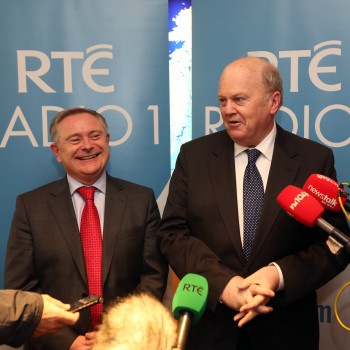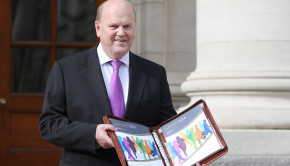Making a hash of the budget

Dan White discusses the astonishing fact that the government has managed to lose support after a give-away budget, falling unemployment figures and even managing to exit the bail-out programme a year early
11 November 2014
The budget looked better than it really was. As the realisation of pending water bills dawned, most people realised that what Michael Noonan and Brendan Howlin had given with one hand, they had already taken back with the other.
On 14 October, Finance Minister Michael Noonan and Public Expenditure and Reform Minister Brendan Howlin delivered their 2015 budget. It was the fourth episode of the fiscal Two Ronnies act that we have experienced since the old Department of Finance was split between the two coalition parties after they first came to office in March 2011.
Giveaway budget
The good news was that after more than six years of fiscal austerity and seven hairshirt budgets, that between them extracted almost €30bn from the economy in tax increases and public spending cuts, this was a neutral budget. With the government having originally planned on a further €2bn of cuts and tax increases in order to meet its target of reducing the budget deficit to under 3% of GDP in 2015, this was a significant milestone.
Unfortunately the government couldn’t resist the temptation to overplay its hand. Instead of emphasising its very real achievement in ending austerity a year early, it strove to dress up Budget 2015 as a sort of Celtic Tiger-style “giveaway budget”. By doing so it raised expectations which it couldn’t possibly hope to fulfil and created a rod for its own back.
The budget contained all sorts of apparent “goodies”. The top rate of income tax was cut by 1% to 41%, the standard rate income tax band was raised by €1,000 to €33,800, the pension levy was scrapped and standard rate tax relief for the first €500 of water charges introduced.
Ungrateful voters
If the government parties were expecting a measure of thanks from a suitably grateful electorate, voters stunned them with their ingratitude. Far from boosting support for the government, opinion polls published in the wake of the budget show that support for Fine Gael and Labour has continued to fall with one opinion poll showing Sinn Fein as the most popular party.
So, with unemployment down to 11% – its lowest level since March 2009, the economy projected to grow by up to 5% this year and austerity at an end, why are voters so reluctant to reward the government parties?
Water charges
The water charges debacle is certainly part of the problem. Instead of doing what it did with the property tax and introducing a straight out tax collected by the Revenue Commissioners, the government decided to dress up water charges as some sort of “conservation” measure designed to get us to use less water – as I look out the window on a wet November day while writing this article somehow I can’t help feeling that whatever else we’re short of in this country it isn’t water.
If the government thought that this would somehow soften the blow of water charges and make them more acceptable to the public, then it was sorely disappointed. The public weren’t fooled. Instead of buying the “conservation” malarkey, water charges became the lightning rod for all of the bitterness, frustrations and resentments that had built up over seven years of austerity.
It didn’t help matters that when people started to calculate how the budget affected them, they quickly discovered that any gains were largely wiped out by water charges. I suspect that if the government had levelled with the people and introduced a fixed water tax per household, promising that this would be the final instalment of austerity, the public would have been far more likely to accept it, as was the case with the property tax. Was it the manner of the introduction of water charges, complete with the egregious super-quango Irish Water, rather than water charges themselves that really infuriated people who felt they were being taken for complete mugs? But water charges are at best only part of the story.
Ironically, the departure of the Troika almost a year ago, an event that was ecstatically welcomed by ministers at the time, seems to have dangerously undermined the coalition’s cohesion.
Lacking feel food factor
One of this government’s greatest achievements has been the increase in the number of people at work and the corresponding fall in those who are unemployed. Unfortunately this increase in employment levels hasn’t been matched by any increase in earnings with the most recent CSO data showing that average private sector wages fell by 0.3% over the past 12 months while average public sector wages fell by 1% over the same period.
This failure of earnings to rise in tandem with employment levels means that the “feel good” factor one would normally associate with more jobs is lacking. This in turn has fed through into consumer sentiment and retail sales. The most recent KBC Bank/ESRI consumer sentiment index showed a sharp fall in consumer confidence in October. While the value of retail sales rose by 3.8% in the year to September, this is still very subdued for an economy that is growing by 5% a year.
Unrewarded by voters
Having oversold the budget, the government now runs the very real risk that its success in bringing the Troika-dictated austerity to an end a year early will go unrewarded by voters. At a time when it should be claiming credit for fixing the dreadful mess it had inherited from the previous government, the coalition is on the defensive on a host of issues.
Ironically, the departure of the Troika almost a year ago, an event that was ecstatically welcomed by ministers at the time, seems to have dangerously undermined the coalition’s cohesion. The presence of the Troika and the tight restrictions it imposed on the government seemed to have the effect of focusing the coalition’s attention on the job at hand.
Now that the Troika has gone the government seems to be at sixes and sevens, with its component parts devoting more attention to squabbling with one another or responding to the latest crisis than actually governing. The Troika-imposed decisiveness of its first two-and-a-half years has been replaced by a sense of drift. This has been ruthlessly exploited by many groups, not just anti-water charge campaigners.
This government has one more budget left before it faces the people in a general election that must take place by the spring of 2016 at the latest. If it is to have any chance of being returned to power it had better do a far better job of selling Budget 2016 to the public than Budget 2015.



 Print
Print




Fans 0
Followers